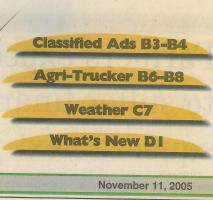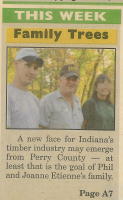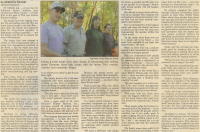Indiana AgriNews
Logging family branches out and up to survive. By: Rebecca Wilson
St. Croix, Indiana - A new face for Indiana's timber industry may emerge from Perry County - at least that is the goal of Phil & Joann Etienne's family.
The family has been logging since the '70's and milling since the '80's, but times turned tough in the late '90's - soon after the family had upgraded their St. Croix-based company to high-grade miling capability - and the family was forced to rethink the way it did business.
The image they now present is rooted in their longstanding ethics of using best management practices in the forest - like the water bars they used 20 years before they were recommended by the state, which are built into logging roads to direct water into leaf litter rather than allowing it to run in erosive sheets down the pathway - but also features new adaptations the company has formulated to keep their business vital, such as colored mulch, custom moldings and furniture manufacturing and log carving.
Even trees, such as mineralized poplar, Kentucky coffee, or soft maple with tracks known as worm holes, once considered bottom rung because there was no place for them in a graded lumber program, now are held out and marketed to people in the market for wood featuring unusual colors or texture.
"We utilize the whole tree, we're not wasting anything," said Cindy Emmons, one of the three Etienne children involved in the company - a forth works as a computer consultant.
Evolving to prime efficiency required the adoption of "a new mindset,"she said, explaining that in the very physical business of logging and milling, employees are required to use their full mental intelligence, as well, and embrace the attitude that "you don't just have to be a family member to do whatever it takes" to get the job done right.
The family found a lot of old-time employees who were accustomed to working at one level of production were unwilling or unable to adjust to the more demanding schedule tighter margins forced.
"The only way to get more done per hour is hire kids - they didn't know what wasn't possible," Joann said.
With a tight staff of 65, Phil Etienne's Timber Harvest, Inc., processes around 12 million board feet of lumber per year and, in the busy spring season, will ship up to 70 bulk loads of colored mulch per week.
The company does not have middle managemtent - in fact, they try to stay away from the term management. Family members are more likely to be found on the line in the mill or working on a harvest in the woods than they are to be behind a desk.
Because the family knows and does every job within their operation, said Cindy, "People that work with us give a lot of respect - you don't often hear 'it's too hard.'"
Even on the day when Gov. Mitch Daniels invited the family as special guests to an unveiling of the new strategic plan for forestry, Phil was late because he wouldn't drag himself away from a harvest.
In a highly global industry, where American companies get beat down on price by countries capable of utilizing cheap harvests and cheap labor, the family sees the new strategic plan for forestry - which will market up to five times more timber than is currently sold from state forests with more flexible payment plans for buyers - as a way to improve its margins by capturing more quality product closer to home.
"We have a governor who thinks the future is quality and the only way to get quality is to manage," Joann said, noting quality will not happen on its own.
She offered a recent white oak harvest as an example. Her company was contracted to selectively harvesta forest that had not been actively managed in generations.
The cut included five of the biggest white oak trees the family had ever handled, but they were the only trees representing the species within the whole woods.
"In the under story there was not a single oak to be found - you gotta have sunlight if you want oak regeneration," she said.
When no trees were cut, a mature canopy made impossible the regeneration of sun-hungry species.
Phil can understand how people get emotional about trees - he said he sometimes feels a melancholy at altering a landscape - but he can't abet leaving trees to die and rot without capturing their value.
"A tree grows in the woods like a weed, Mother Nature asks very little of us - when we don't put out effort we're turning into a spoiled, lazy country," he said.
"We can't compete on a world market if we don't think management, (but)forestry management is like surgery, you don't just go to any doctor."
"The guys with the chain saws make the biggest difference - they put 'em down where they need to go and protect the ongoing crop,"Joann said.
"Most people judge (harvestors) by ruts and mud on the highway - if you can keep it pretty 90 percent will be satisfied, but if you really want to judge a logging site, go in and look up. Protecting the residual stand is our No. 1 job - the second job is to go down stream and look (for sediment erosion)."
The family team takes pride in its skill at directional harvesting, a technique that can fell a tree - even one leaning at a contradictory angle - in the plane of least disturbance."
By actively engaging the public through billboard advertising, direct contact at their Bear Hollow Wood Shop, where they market their chainsaw carvings and other handicraft, or educational outreach projects at county fairs, the family hopes to counteract negative impressions of the industry generated by unlicensed or unethical harvesters that the family has seen plague southern Indiana by swindling uneducated landowners to sell tress for less than they're worth, then harvesting them in an unprofessional manner.
Cindy said the carvings are especially good for breaking the ice, as they get people to talking about their trees and asking questions or airing concerns about the logging industry.
"We're not quite the cave man they pictured to be a logger," she said.
The chainsaw manufacturing company Echo also believes in the marketing power of chain saw carvings, recently forming their own professional carving team.
Cindy's husband, Jason Emmons, who also is a member of the Etienne team, is the Echo team's youngest member and now travels the country as voice of the company and industry.
Cindy has been instrumental in the creation of landowner appreciation packets that include information about timber management and what to expect during a harvest, and "fun stuff" such as hats, T'shirts and colorul index file fans addressing topics such as tree and wildflower identification.
According to Joann, who thinks much of the industry has not accepted what she believes is a permanent downturn in margins, "this downsizing and tough times might be the best thing that ever happened to Etienne's Timber - there's no detail that's not critical now."



